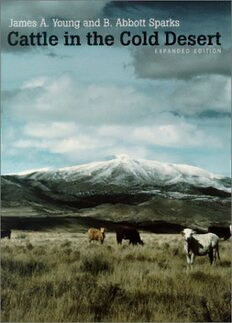Download Cattle in the cold desert PDF Free - Full Version
Download Cattle in the cold desert by James Albert Young, B. Abbott Sparks in PDF format completely FREE. No registration required, no payment needed. Get instant access to this valuable resource on PDFdrive.to!
About Cattle in the cold desert
First published in 1985, Cattle in the Cold Desert has deservedly become a classic in the environmental history of the Great Basin, brilliantly combining a lively account of the development of the Great Basin grazing industry with a detailed scientific discussion of the ecology of its sagebrush/grassland plant communities. The volume traces the history of white settlement in the Great Basin from about 1860, along with the arrival of herds of cattle and sheep to exploit the forage resources of a pristine environment and, through the history of John Sparks, a pioneer cattleman, illustrates how the herdsmen interacted with the sagebrush/grasslands of the cold desert West. As the story unfolds on two levels-that of the herdsmen adapting their livelihood to the challenging conditions of the Great Basin's scanty forage, aridity, and fierce winters, and that of the fragile ecology of the desert plant communities responding to the presence of huge herds of livestock-we see the results of a grand experiment initiated by men willing to venture beyond the limits of accepted environmental potential to settle the Great Basin, as well as the often ruinous consequences of the introduction of domestic livestock into the plant communities of the region. The result is a remarkably balanced, astute, and insightful discussion of the grazing industry in the Intermountain West. This new paperback edition includes an additional chapter that addresses the impact of wild mustangs on the Great Basin rangelands, and an epilogue that discusses changes in rangeland management and in rangeland conditions, especially the impact of recent wildfires, since the book was first published. As concern over the future of the Great Basin's unique rangeland environment and its principal agricultural industry grows, Cattle in the Cold Desert remains essential reading for everyone who cares about this vast and underappreciated region of the American West.
Detailed Information
| Author: | James Albert Young, B. Abbott Sparks |
|---|---|
| Publication Year: | 2002 |
| ISBN: | 9780874175035 |
| Pages: | 334 |
| Language: | English |
| File Size: | 4.77 |
| Format: | |
| Price: | FREE |
Safe & Secure Download - No registration required
Why Choose PDFdrive for Your Free Cattle in the cold desert Download?
- 100% Free: No hidden fees or subscriptions required for one book every day.
- No Registration: Immediate access is available without creating accounts for one book every day.
- Safe and Secure: Clean downloads without malware or viruses
- Multiple Formats: PDF, MOBI, Mpub,... optimized for all devices
- Educational Resource: Supporting knowledge sharing and learning
Frequently Asked Questions
Is it really free to download Cattle in the cold desert PDF?
Yes, on https://PDFdrive.to you can download Cattle in the cold desert by James Albert Young, B. Abbott Sparks completely free. We don't require any payment, subscription, or registration to access this PDF file. For 3 books every day.
How can I read Cattle in the cold desert on my mobile device?
After downloading Cattle in the cold desert PDF, you can open it with any PDF reader app on your phone or tablet. We recommend using Adobe Acrobat Reader, Apple Books, or Google Play Books for the best reading experience.
Is this the full version of Cattle in the cold desert?
Yes, this is the complete PDF version of Cattle in the cold desert by James Albert Young, B. Abbott Sparks. You will be able to read the entire content as in the printed version without missing any pages.
Is it legal to download Cattle in the cold desert PDF for free?
https://PDFdrive.to provides links to free educational resources available online. We do not store any files on our servers. Please be aware of copyright laws in your country before downloading.
The materials shared are intended for research, educational, and personal use in accordance with fair use principles.

